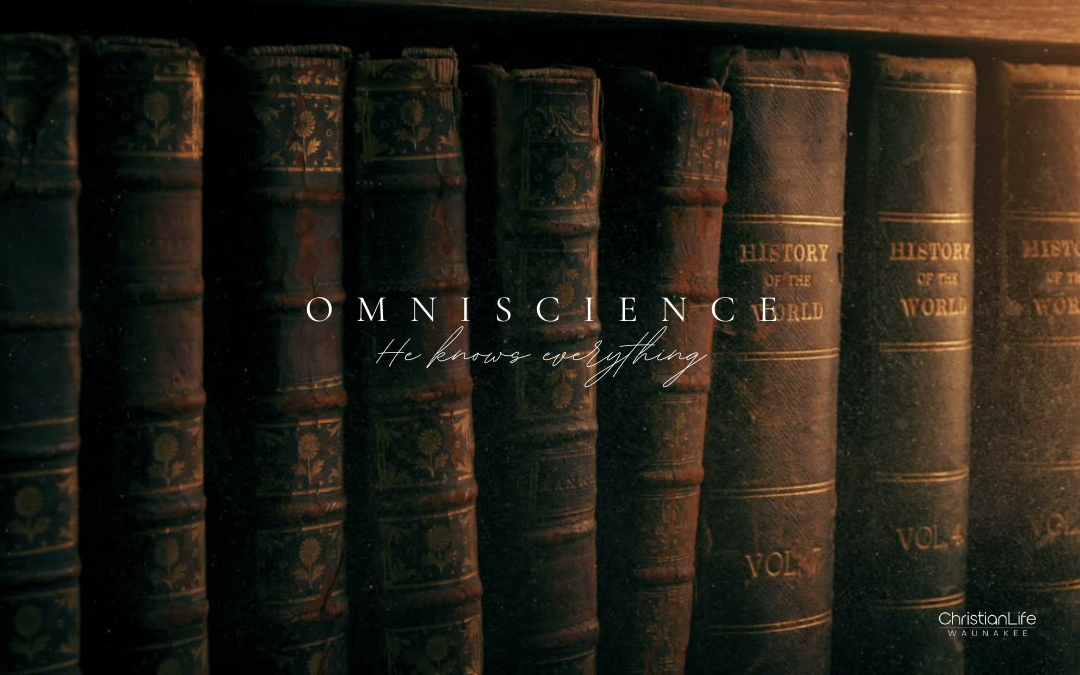In addition to omnipotence (all-powerfulness) and omnipresence (everywhere-presence), there’s a third “omni” that people use to describe God: omniscience. Science comes from the Latin word scientia, meaning “knowledge,” so omniscience means knowledge of everything. This characteristic of God has many implications for how we relate to Him and how He relates to us. Although I find God’s omniscience at times challenging to understand and accept, here are a few imperfect thoughts on the subject.
Our Omniscient God Knows All of Human History
Acts 17:26 says, “From one man he made all the nations, that they should inhabit the whole earth; and he marked out their appointed times in history and the boundaries of their lands” (NIV). No matter how shocking and confusing the events of our world may seem to us, nothing surprises God.
Our Omniscient God Understands Everything About the Created Universe
In Job 38:4-5, God asks,
“Where were you when I laid the earth’s foundation?
Tell me, if you understand.
Who marked off its dimensions? Surely you know!
Who stretched a measuring line across it?” (NIV)
We humans are smart. We think we’ve figured out a lot of what makes our universe tick. But there are still mysteries that baffle the brightest scientific minds. What’s inside a black hole? What’s dark matter? What lives in the twilight of the deepest, darkest ocean depths? None of these things are mysteries to God. Who can know creation better than its Creator?
Our Omniscient God Is a Shepherd Who Knows His Sheep
According to Ephesians 1:4-6, “he chose us in him before the creation of the world to be holy and blameless in his sight. In love he predestined us for adoption to sonship through Jesus Christ, in accordance with his pleasure and will— to the praise of his glorious grace, which he has freely given us in the One he loves” (NIV). This “predestination” is often a hard concept even for believers to understand, and Christians disagree about what exactly it means. In my understanding, there are broadly two main views: the Reformed/Calvinist view (God knows who will be saved because He chooses a select number and ensures they accept Him) and the Arminian/Wesleyan view (God offers salvation to everyone but can see ahead of time who will choose Him). Either way, God already knows His flock long before they are even born. As a believer, you were chosen before the foundation of the earth was laid.
Our Omniscient God Knows Us Better Than We Know Ourselves
In Psalm 139, David praises God for knowing everything about him, from his inner thoughts to words that have never been spoken. God knows every last bit of our personality, desires, dreams, abilities, and secret thoughts. I’m reminded of a quote at the end of a New York Times op-ed by Tim Kreider that’s become somewhat of a meme: “If we want the rewards of being loved we have to submit to the mortifying ordeal of being known.” The point is that being loved unconditionally means letting someone see all our flaws and love us despite them. Being loved unconditionally is what we all want and fear most. But as an omniscient being, that is exactly what God has chosen to do—love us in spite of and because of everything He knows about us.
Works Cited
Kreider, Tim. “I Know What You Think of Me.” The New York Times, 15 June, 2013, https://opinionator.blogs.nytimes.com/2013/06/15/i-know-what-you-think-of-me/
—————————————————

